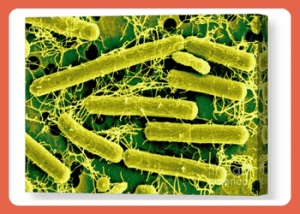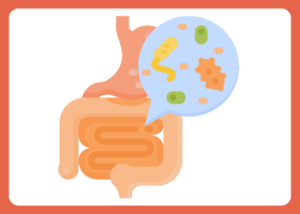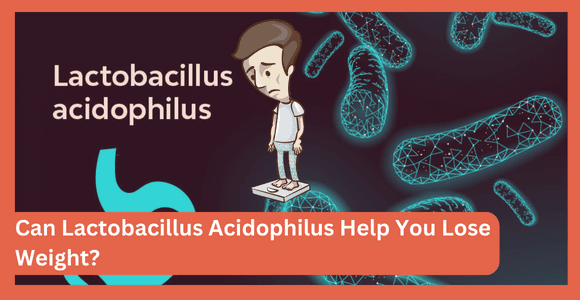The probiotic strain, Lactobacillus acidophilus, has recently become increasingly well-known due to its possible benefits for health. One of the most intriguing areas is how it could be employed in fighting obesity – an issue that plagues global populations and requires a grand solution.
Despite some studies pointing towards the potential of probiotics, such as L. acidophilus, to have weight-related benefits, further research is needed before an ultimate conclusion can be drawn. Therefore, it is essential that we delve into existing research on L. acidophilus and its role in weight loss for a more comprehensive understanding of this topic.
Table of Contents
What is Lactobacillus Acidophilus?
Beneficial for human health, Lactobacillus acidophilus is a natural probiotic bacteria commonly found in the gut.
It belongs to the extensive Lactobacillus genus and can convert sugars like lactose, glucose, and more into helpful compounds such as lactic acid, hydrogen peroxide, and bacteriocins when fermented.
 Researchers have discovered that L. acidophilus aids in maintaining a healthy gut by assisting the growth of helpful bacteria and curbing dangerous ones.
Researchers have discovered that L. acidophilus aids in maintaining a healthy gut by assisting the growth of helpful bacteria and curbing dangerous ones.
Additionally, studies indicate potential additional health benefits such as an enhanced immune system, lower cholesterol levels, and relief from digestive issues including diarrhea and IBS.
Yet there is still much to be explored concerning the healing applications of probiotics like L. acidophilus—demanding further research for full comprehension.
The Best Probiotics for Weight Loss
Despite the prevalence of probiotics in weight loss plans, there is very little scientific evidence to back up their effectiveness. However, some strains of probiotics have been associated with potential weight-related benefits, such as:
- Lactobacillus gasseri: Numerous research studies have indicated that this particular strain of probiotics may be instrumental in aiding overweight and obese individuals to reduce their overall body weight and fat mass.
- Bifidobacterium lactis: Research has demonstrated that this particular strain can help to optimize body composition, reduce waist size, and decrease inflammation.
- Lactobacillus rhamnosus: This particular strain has been linked with decreased body weight and fat in certain studies, even though results have differed.
Despite the evidence being limited at this point, there is potential for probiotic strains to be beneficial in weight loss. However, it cannot be emphasized enough that diet and exercise remain the most significant contributors when trying to achieve a healthy weight.
That’s why more research needs to take place so we can confirm if these specific probiotics do provide an additional advantage or not.
How Gut Bacteria Help You Lose Weight
Your digestive system is home to a variety of bacteria that your body relies on for numerous vital functions. These microbial inhabitants assist in the production of B vitamins, the metabolism of fiber into beneficial fatty acids like butyrate, and even the creation of certain essential fatty acids! In essence, they are playing an irreplaceable role in helping you maintain optimal health.
 Probiotics can potentially curb hunger and boost energy levels with their production of short-chain fatty acids, including butyrate.
Probiotics can potentially curb hunger and boost energy levels with their production of short-chain fatty acids, including butyrate.
When healthy bacteria break down starches they generate higher quantities of butyrate which helps reduce insulin resistance while managing the hormones that control appetite.
Subsequently, when lacking adequate bacteria in the gut, you won’t receive vital signals that let you know when to stop eating. This leads to overeating and an increased risk of weight gain.
Recent research suggests that certain probiotics may actually impede the digestion of fat, leading to an increased amount of fat being expelled in feces. In other words, these particular bacteria are able to draw fewer calories from what you consume. It has been discovered that the Lactobacillus family bacteria is capable of such activity.
What Happens When You Take Probiotics?
Probiotics don’t change how your body functions, but they do help to facilitate the natural processes of digestion and absorption so that you can get the most benefit from food.
When beginning a probiotic regimen, you might not detect any variations right away. However, after several weeks of taking it consistently, you could experience better energy levels and an improved waistline due to lesser bloating.
Since most studies that investigate the relationship between probiotics and weight loss take place over 12-24 weeks (or even longer), do not anticipate rapid weight reduction.
Lactobacillus Acidophilus Side Effects & Benefits
A probiotic is not a magical potion that alters your body’s processes, BUT it does encourage natural digestive functioning and absorption of essential nutrients from food.
- Improved digestive health: It is known to help maintain a healthy balance of gut bacteria, which can improve digestion and prevent digestive issues like bloating, diarrhea, and constipation.
- Enhanced immune function: It has been shown to boost the immune system by increasing the production of antibodies and stimulating the activity of immune cells.
 Reduced cholesterol levels: Some studies have suggested that Lactobacillus acidophilus can help lower LDL (bad) cholesterol levels in the blood.
Reduced cholesterol levels: Some studies have suggested that Lactobacillus acidophilus can help lower LDL (bad) cholesterol levels in the blood.- Prevention of vaginal infections: It is a natural inhabitant of the vagina, and supplementing with this probiotic may help prevent and treat bacterial vaginosis and other vaginal infections.
Side Effects:
- Digestive discomfort: Some people may experience bloating, gas, or diarrhea when they first start taking Lactobacillus acidophilus supplements. This usually resolves within a few days as the body adjusts to the new bacteria.
- Allergic reactions: In rare cases, some people may be allergic to Lactobacillus acidophilus and experience symptoms like itching, hives, or difficulty breathing.
- Risk of infection: While uncommon, there have been reports of Lactobacillus acidophilus causing infections in people with weakened immune systems or who have had recent surgery. It is important to talk to a healthcare provider before taking any new supplement, especially if you have a medical condition or are taking medications.
Starting a probiotic supplement may bring about temporary gas and bloating, but this discomfort usually passes after only two days. Subsequently, those who commit to taking probiotics (~50 billion CFU) can expect improvements in their digestion without the risk of side effects like nausea or abdominal pain.
However, individuals with underlying health problems should take extra caution as they may be more susceptible to such adverse reactions.
Frequently Asked Questions
Is Lactobacillus Good for Weight Loss?
After much research, the most successful strains of probiotics and synbiotics found to assist in weight loss come from the genus Lactobacillus and Bifidobacterium. Studies have revealed that these specific bacteria could be highly effective for overweight or obese populations looking to shed some pounds.
Which Lactobacillus is Best for Weight Loss?
Lactobacillus gasseri appears to be one of the most effective.
Which Probiotic is Best for Weight Loss?
Garden of Life Dr. Formulated Probiotics Fitbiotic Powder
How Fast Do You Lose Weight on Probiotics?
A comprehensive scientific review of 2021 data reveals that weight loss over a period of 12 weeks is attainable through the regular consumption of probiotics alongside other health-promoting practices such as exercise.
What is the Best Lactobacillus Gasseri Probiotic for Weight Loss?
Swanson that Offering 3 billion CFU.
Which Probiotics Cause Weight Gain?
Recent studies have presented a potential correlation between certain bacterial strains and weight gain, though further research is necessary to confirm these findings. Currently, the body of evidence available on this subject is still relatively sparse.
Conclusion. So, Does Lactobacillus Acidophilus Help You Lose Weight?
The proof of whether or not Lactobacillus acidophilus (la-14 too) can be beneficial for weight loss is restricted and inconclusive. Some research has proposed that probiotics, including L. acidophilus, might have possible benefits with regard to fat reduction and body weight – yet the evidence isn’t strong enough to make definite proposals regarding this matter.
It’s essential to remember that personal reactions to probiotics can differ, and factors such as diet and exercise may have a larger influence on weight loss than the use of probiotics alone. As a result, while L. acidophilus could potentially provide other health advantages, more research must be conducted in order to affirm its role in regulating weight management.

 Reduced cholesterol levels: Some studies have suggested that Lactobacillus acidophilus can help lower LDL (bad) cholesterol levels in the blood.
Reduced cholesterol levels: Some studies have suggested that Lactobacillus acidophilus can help lower LDL (bad) cholesterol levels in the blood.